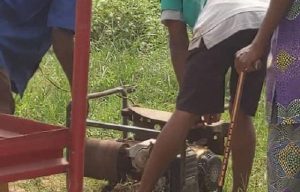The Federal and all State Governments have been called upon to put the necessary policies in place that will encourage local production of feed, thereby helping to reduce the cost of farming, increase yield, and ultimately ensure food security in the country.

A waste-to-wealth expert, Mr. Gregory Ohiaeri, made the call during an interview, noted that, with the right policies, organic wastes generated across the country could be converted into fertilisers, feed for farm animals, and methane gas for the generation of electricity that could lead to massive job creation.
Ohiaeri is the Managing Director of Waste to Table Limited, an organic waste conversion outfit that specialises in producing organic fertilisers, animal feed, and methane gas for power generation using municipal wastes.
He has over the years been in partnership with the Lagos State government in managing wastes generated in the state.
While decrying the impact of the high cost of feed that caused a broiler chicken to be sold at about N15,000 last Yuletide celebrations, he said the authorities must act fast to address the problem so that small holder farmers would remain in business and food would be affordable in the country.
He said: “If you look at the trend now, a lot of small-scale farmers are going out of business. The reason why they are going out of business is not that they are not interested in farming, it’s just that the cost of feed is affecting them a lot. Poultry feed is about N14,500 per 25 kg.
“And if you look at all these things, it’s becoming very expensive. Last Christmas, a broiler was sold at about N15,000 for one, compared to before.”
He said the series of lab tests conducted on the animal feed and fertilisers produced at the Waste to Table organic waste conversion plant located at Odogunyan, Ikorodu, Lagos showed that they are of high quality with an increased percentage of protein.
He also said that the animals being fed on their products are doing well and that people prefer them because they taste better unlike the others fed with chemical feeds.
“We have set up our processes to test some of the feed that we produce here, using organic wastes.
“So far, the tests are looking good as revealed by the feed analysis from Alpha Lab on our chicken feed.
“As we test this thing, we have noticed that it’s doing very well. The animals are doing very well. They are growing, they are adding weight.
“I have a lot of customers that prefer to buy our animals than to buy from somewhere else because they will tell us that our animals taste different from the ones that are outside. So they prefer to come out here and buy our animals, and our animals are not as expensive as the ones you have outside. So that’s the reason why we are in business, to see how we can develop this feed locally here, and reduce the cost, and make sure that our food security is there,” he said.
Ohiaeri said his goal is to franchise Waste to Table in all the states of the federation, leveraging it to ensure proper management of waste generated in the nation’s cities, while converting the waste into products to promote agriculture and power generation.
He also said that it would lead to massive job creation, especially for youths who would be working in different waste-to-wealth value chains.
“First of all, we would need to get the support of the government. We plan on franchising Waste to Table in different states to process the organic waste. So we have to have the government policy backing so that these investors will know that their investment is secure.
“Once the government buys into it, which I believe the government will do, it’s just a question of introducing the process to them. Right now, we’re doing it in Lagos State. We plan on moving to different states very soon, probably by 2024.
“The production is there for the protein, animal feed, the market is there. The market is huge. For the other products on the composting side of it, we still need to do some awareness in terms of getting the farmers to know that other alternatives are cost-efficient than chemical fertilisers, ” he said.
By Innocent Onoh
